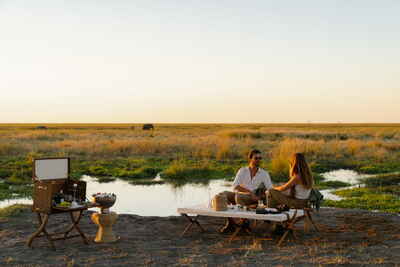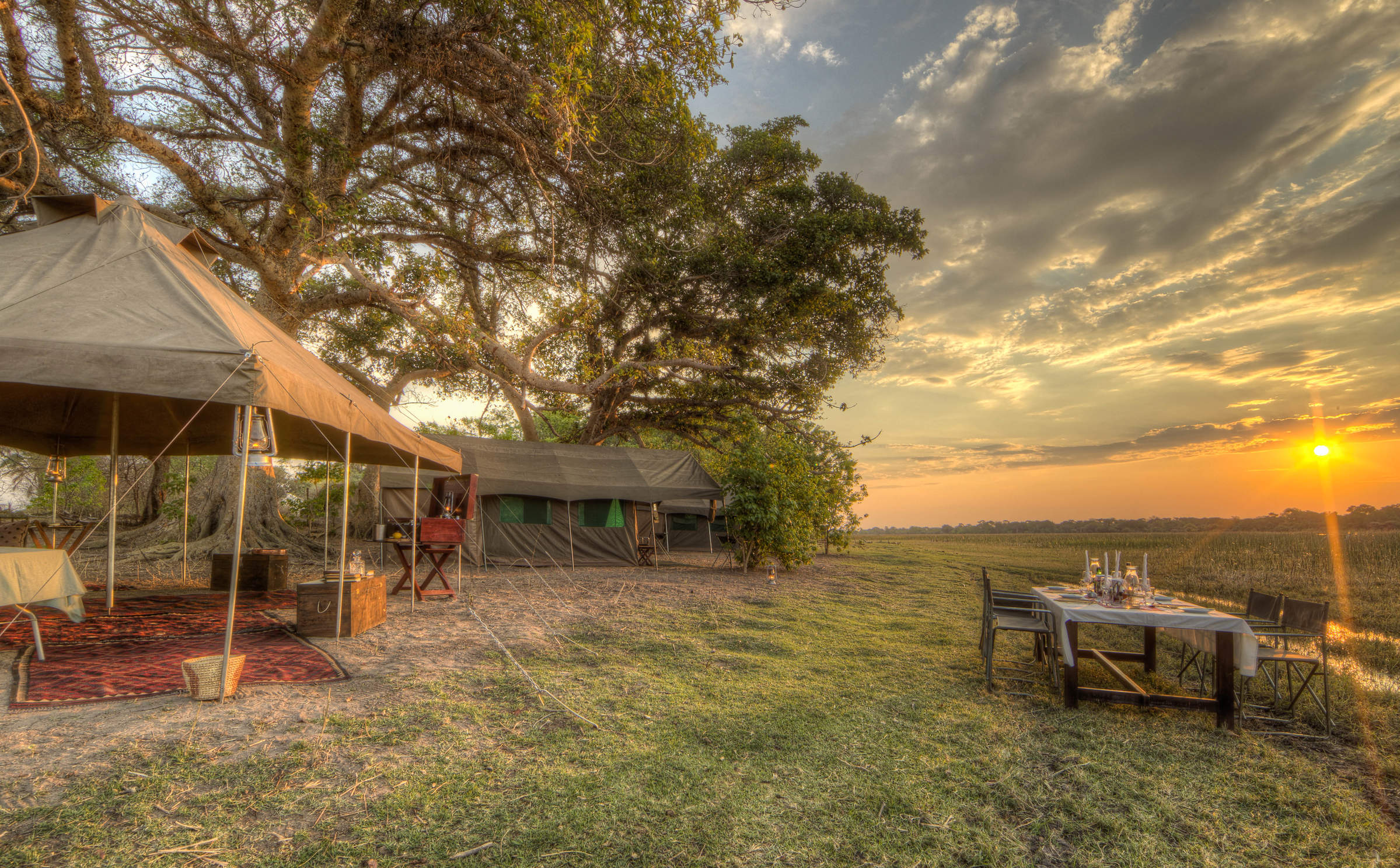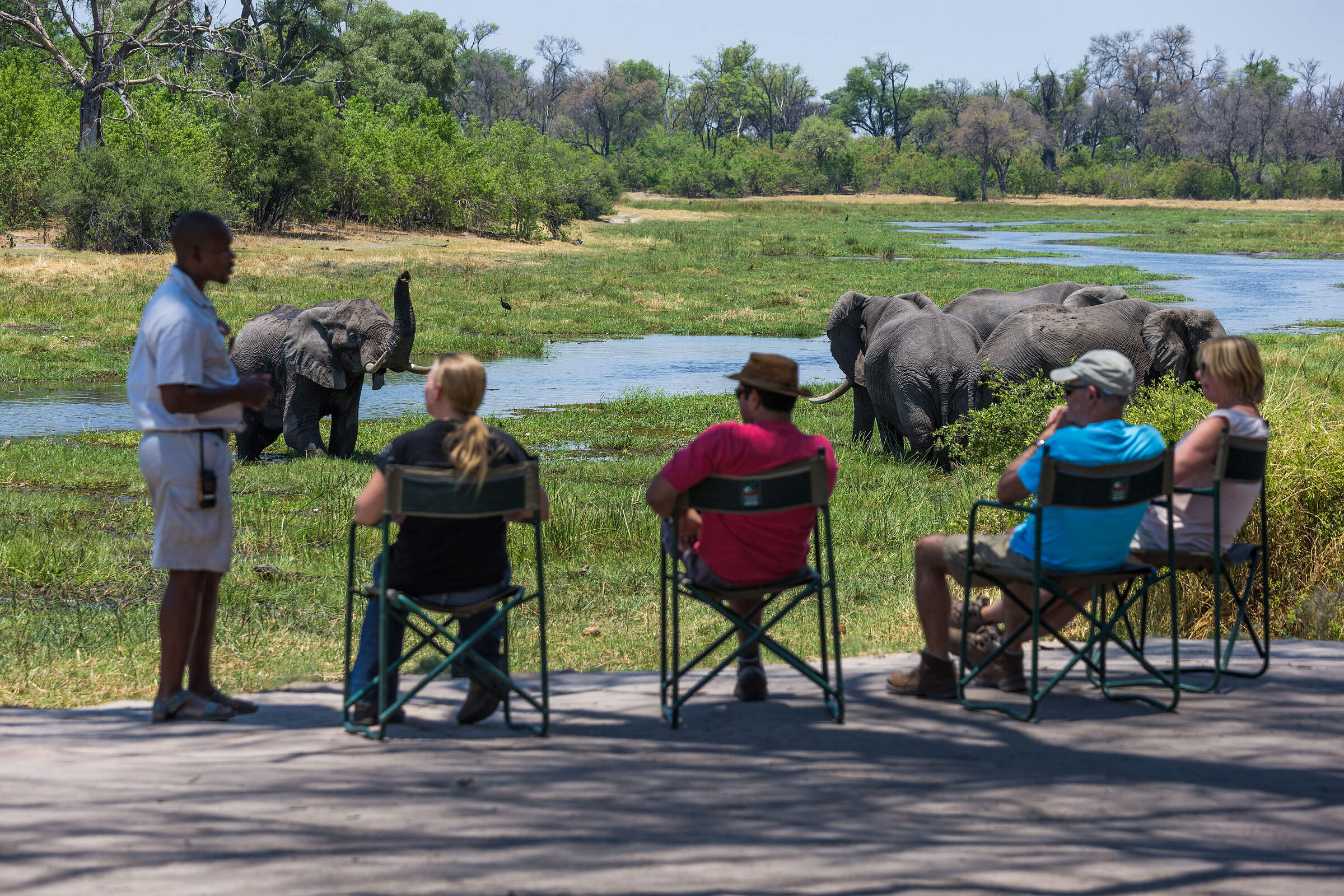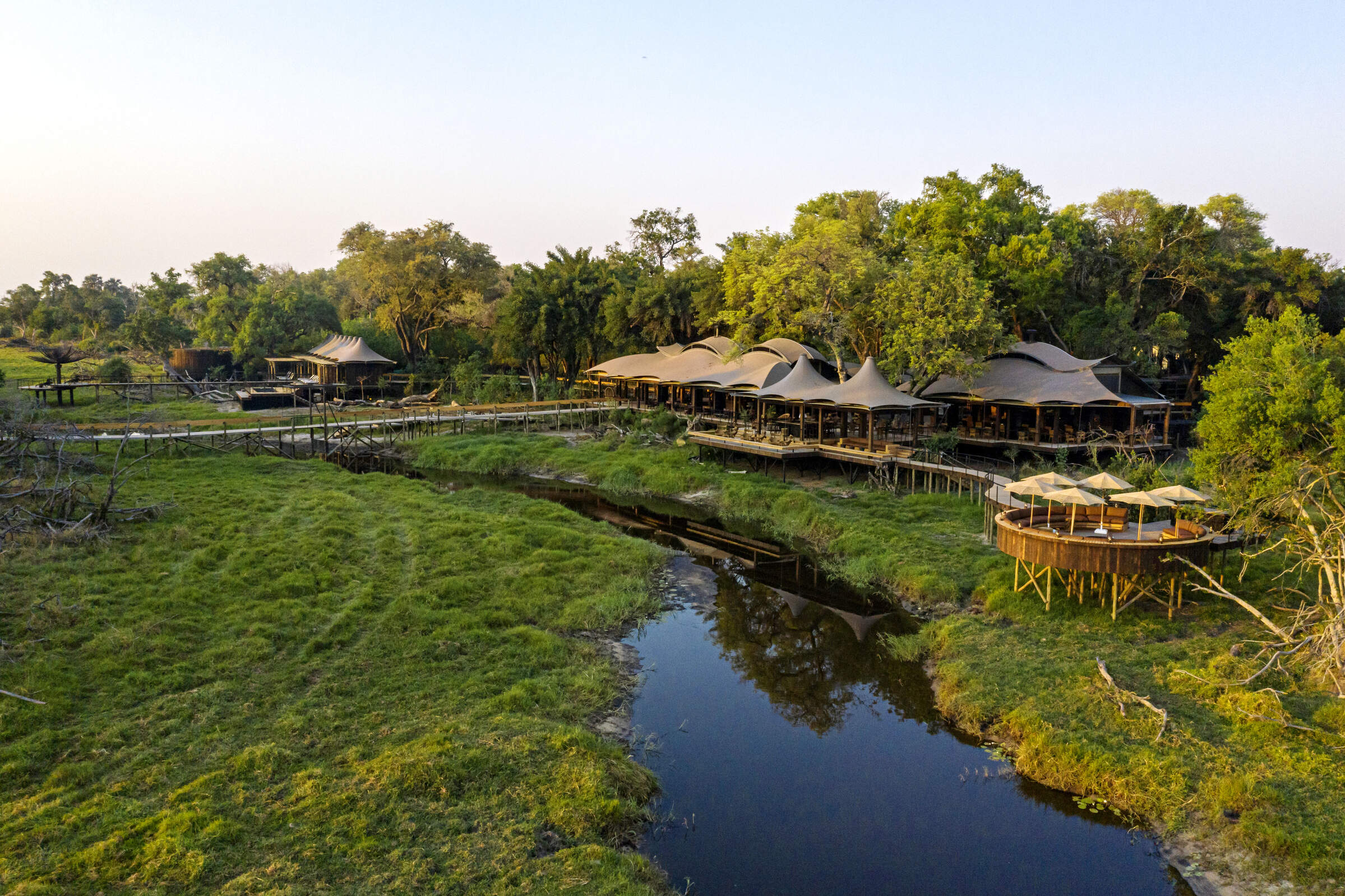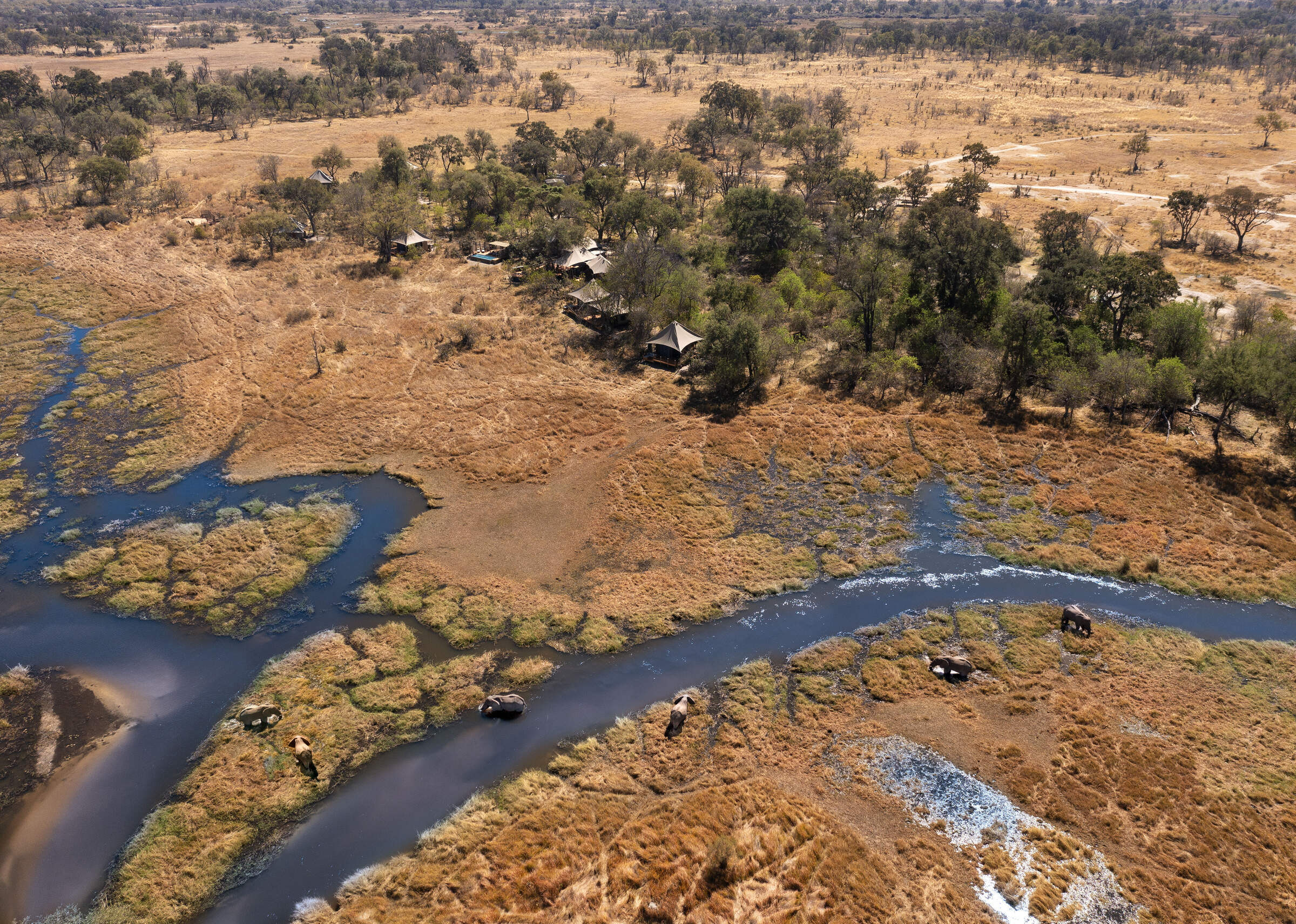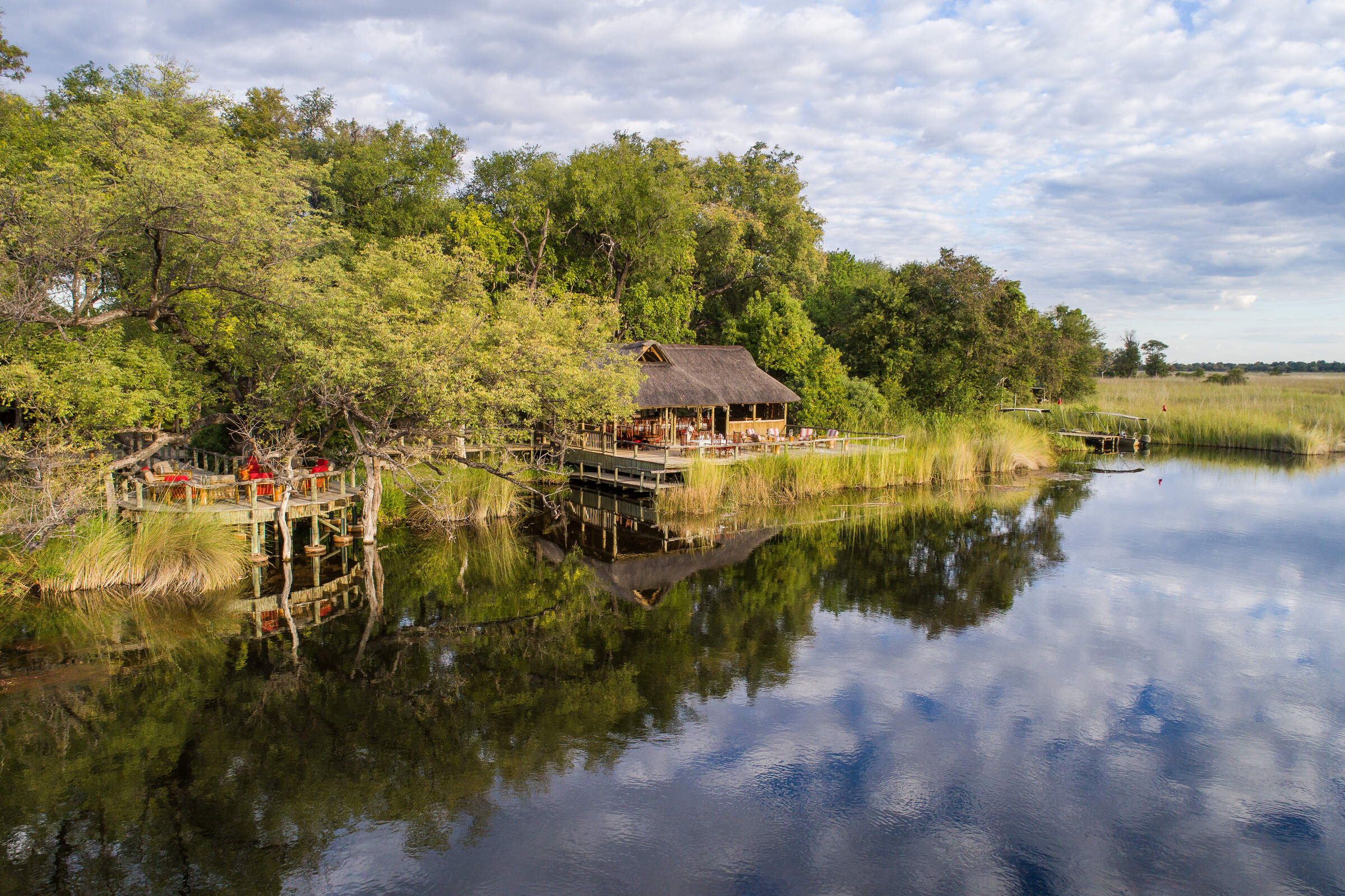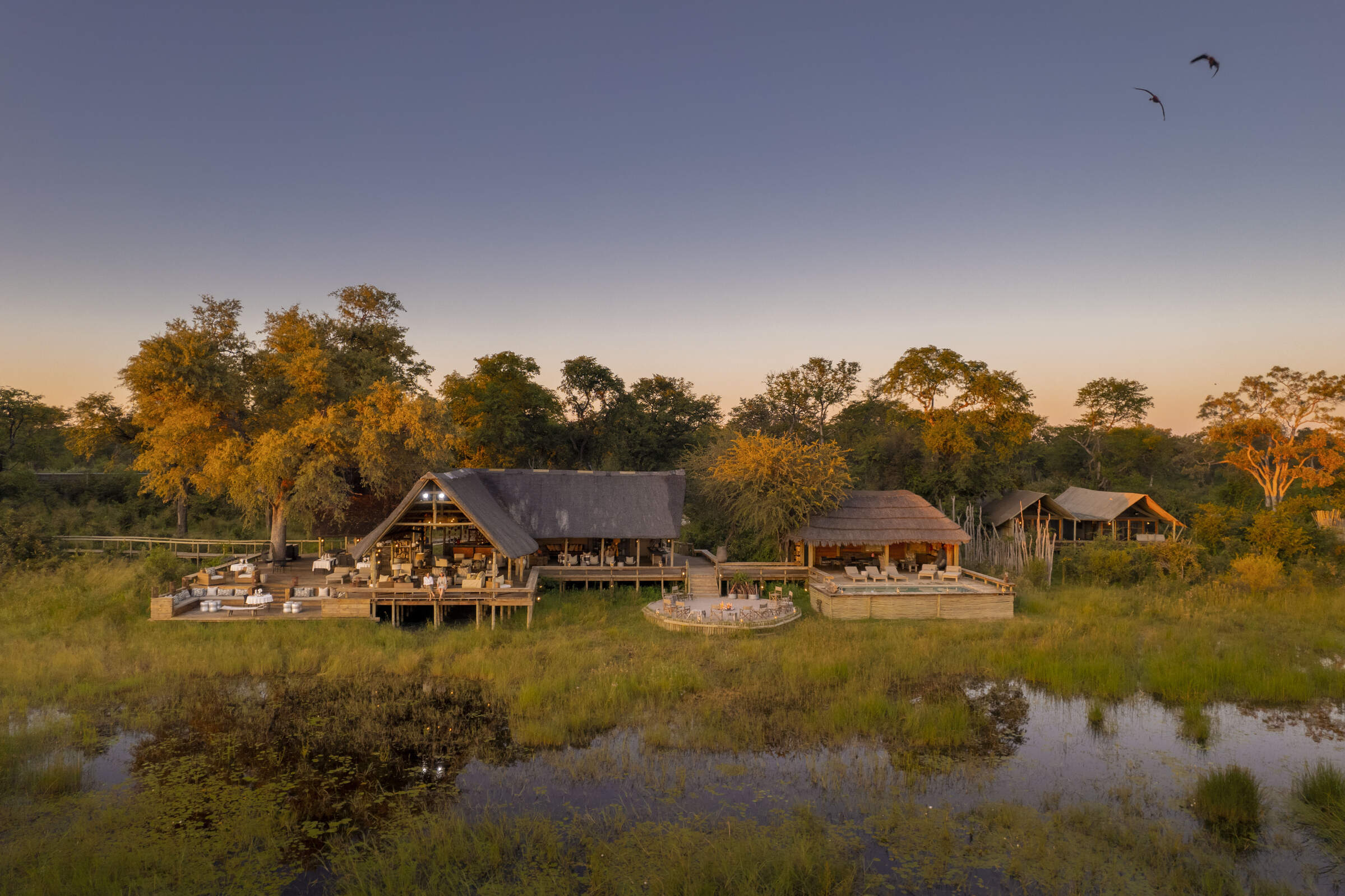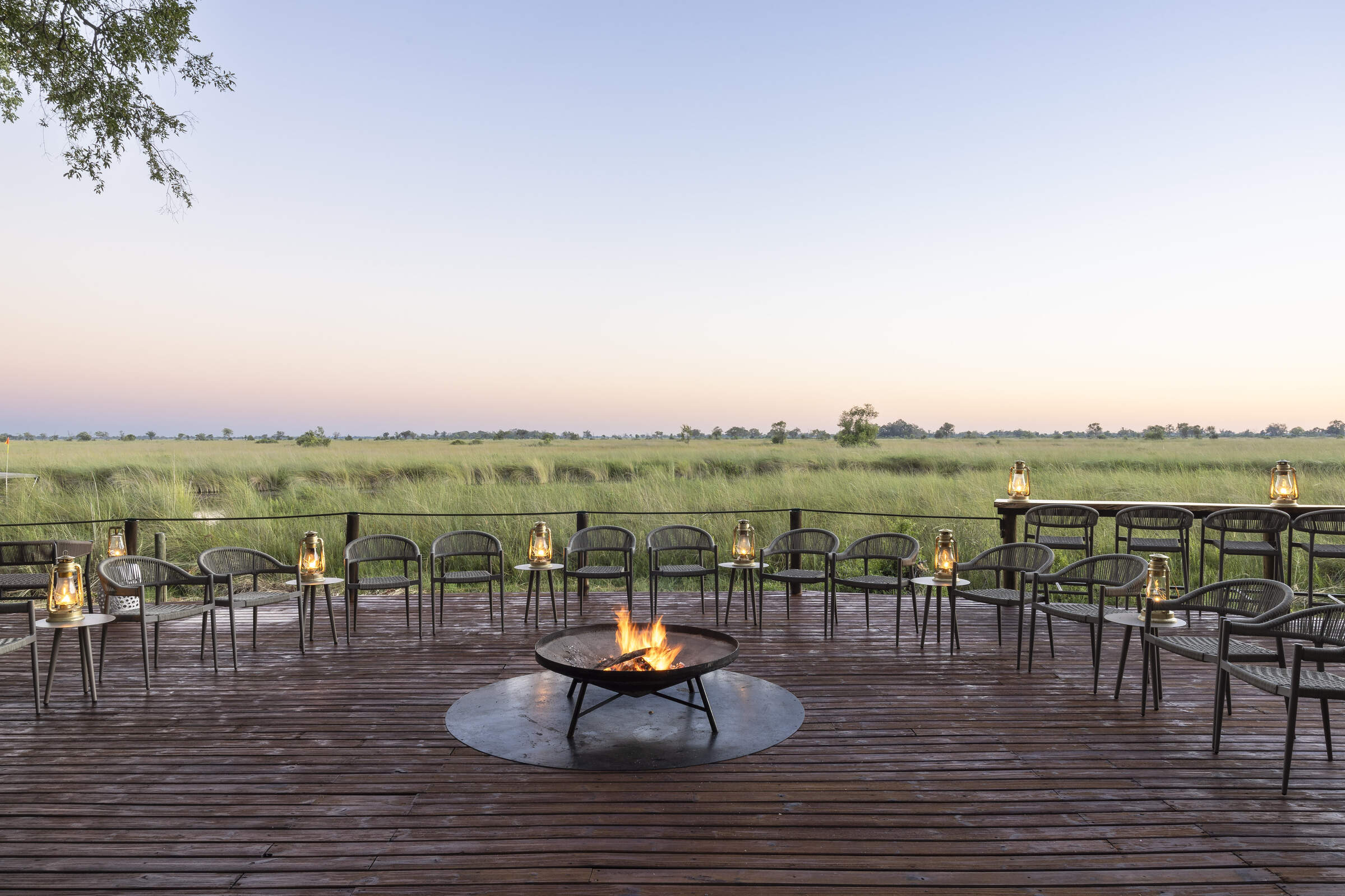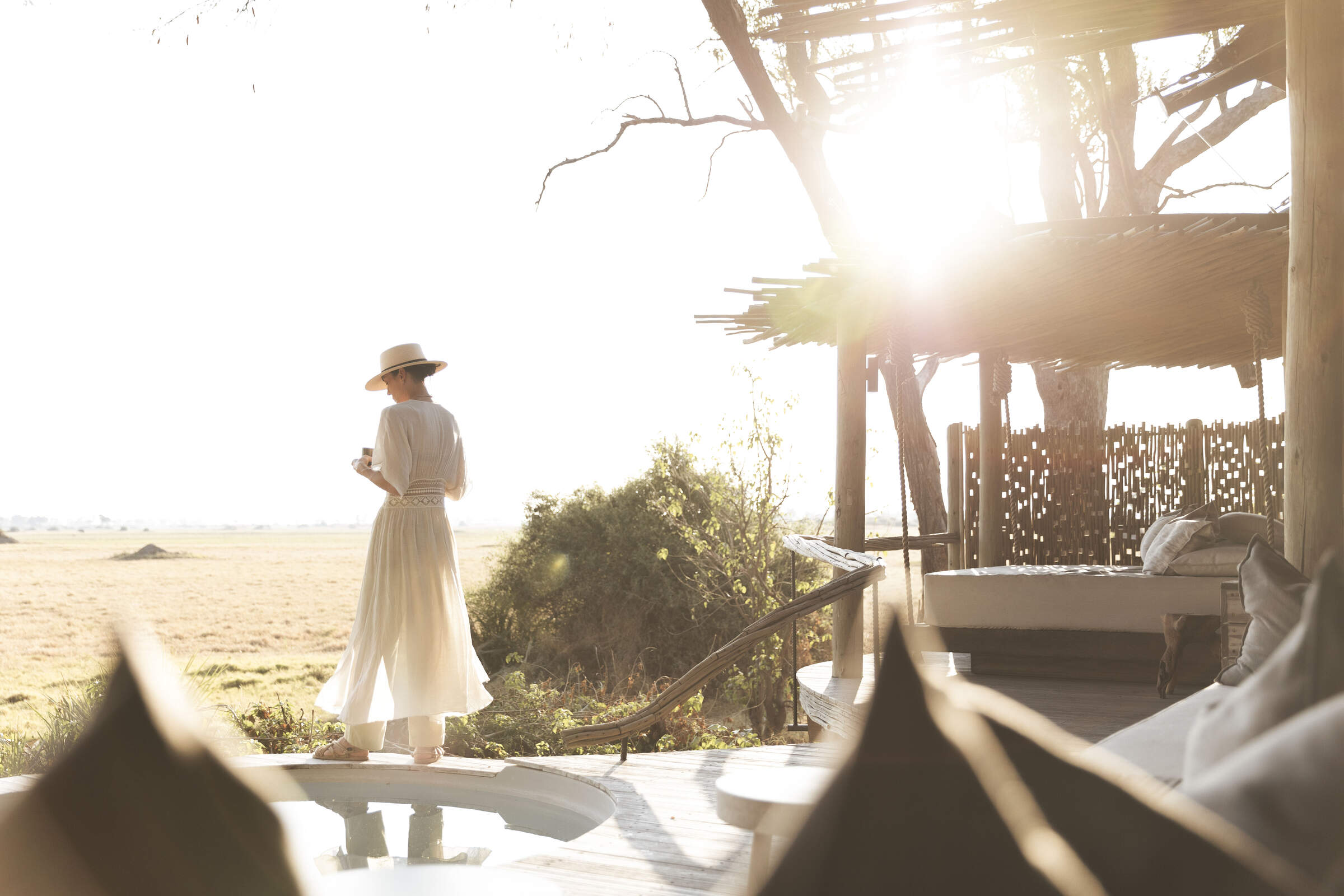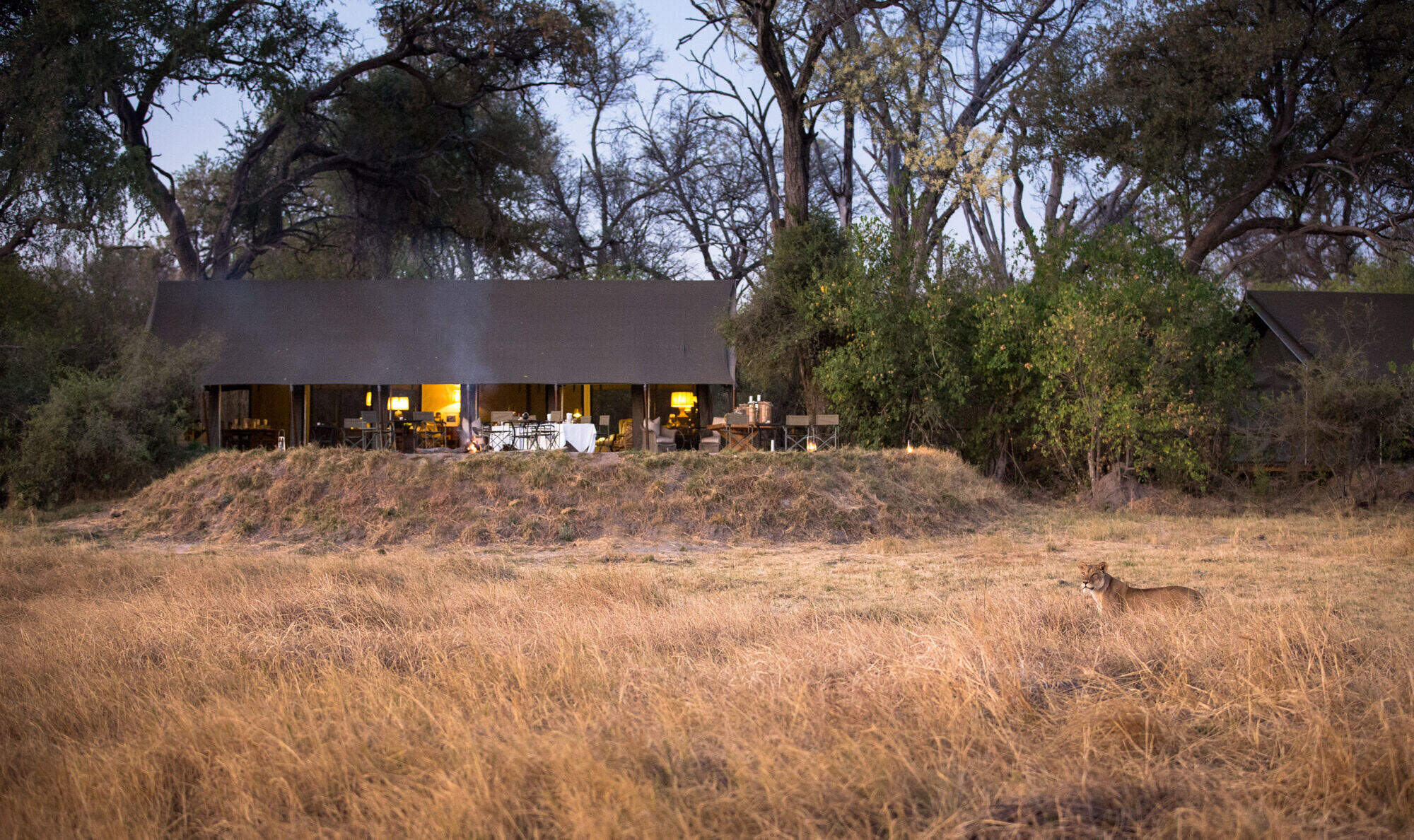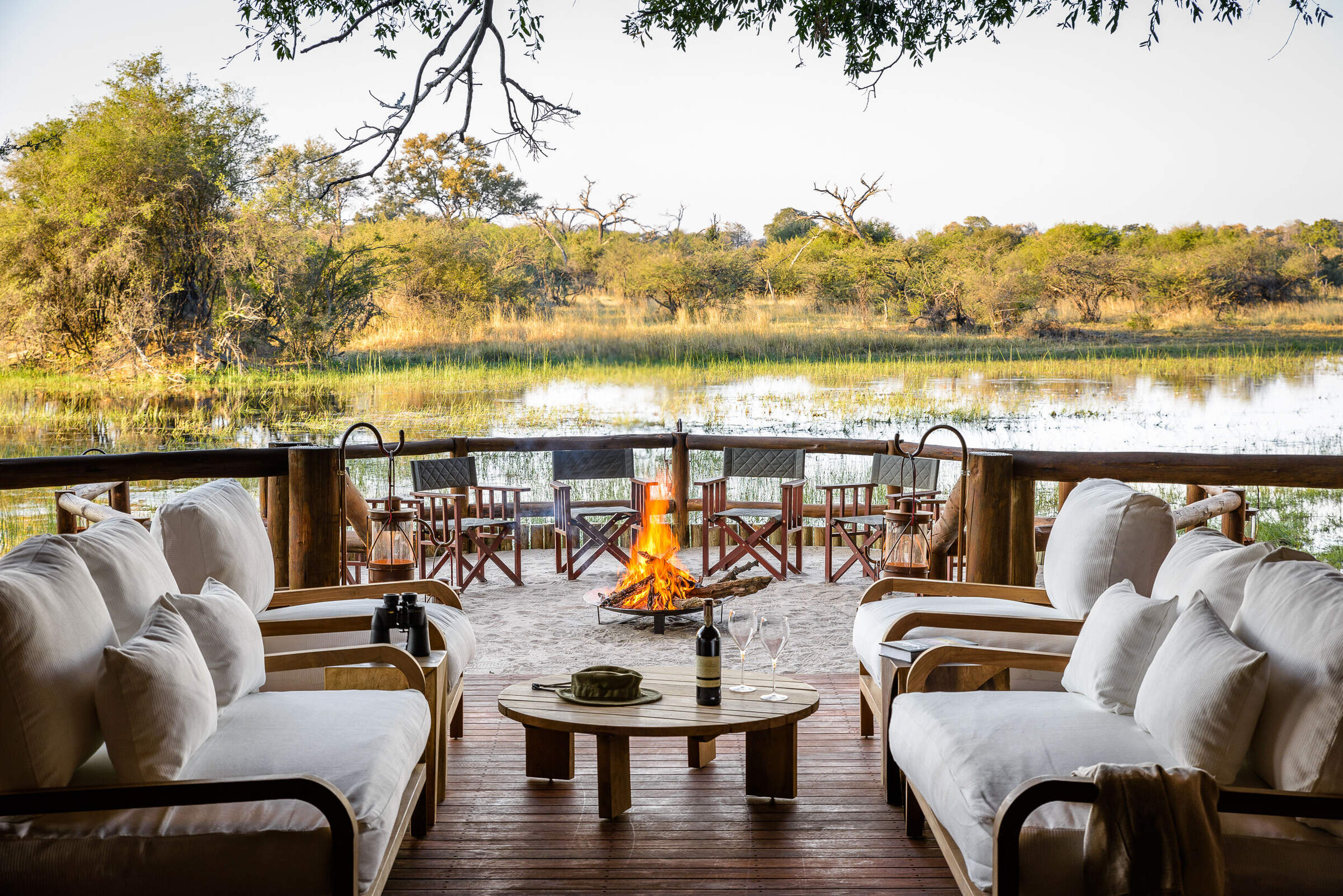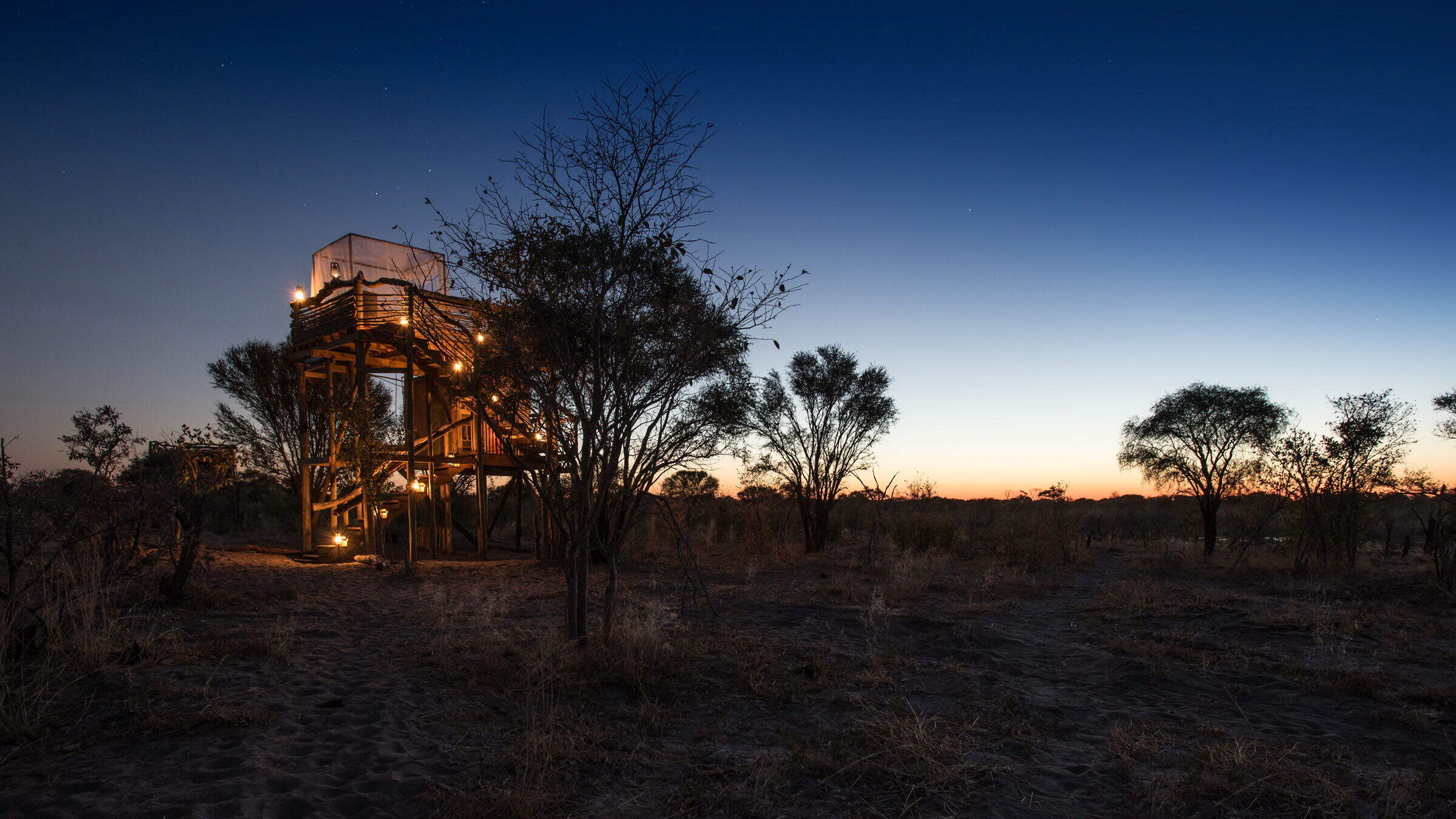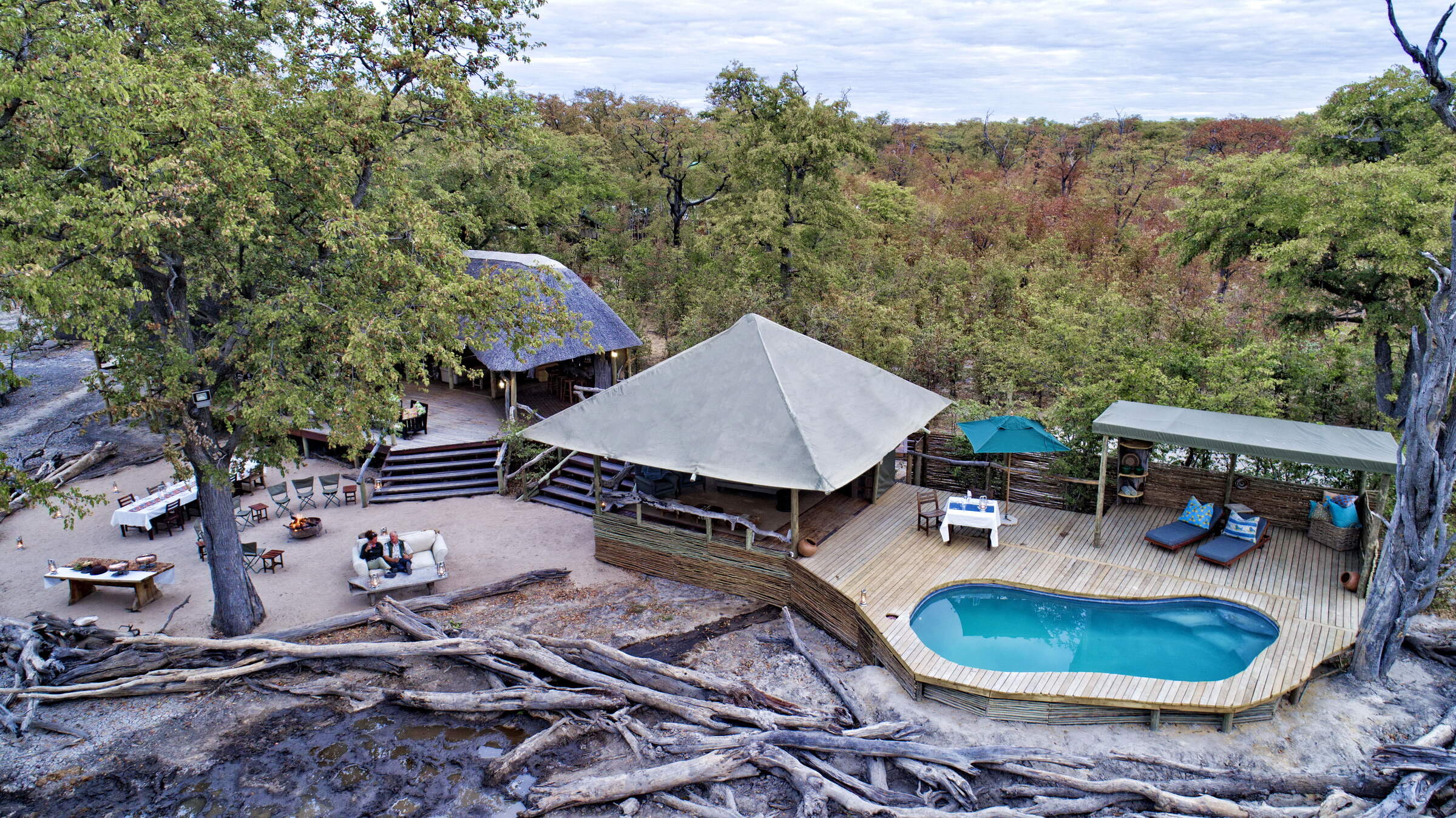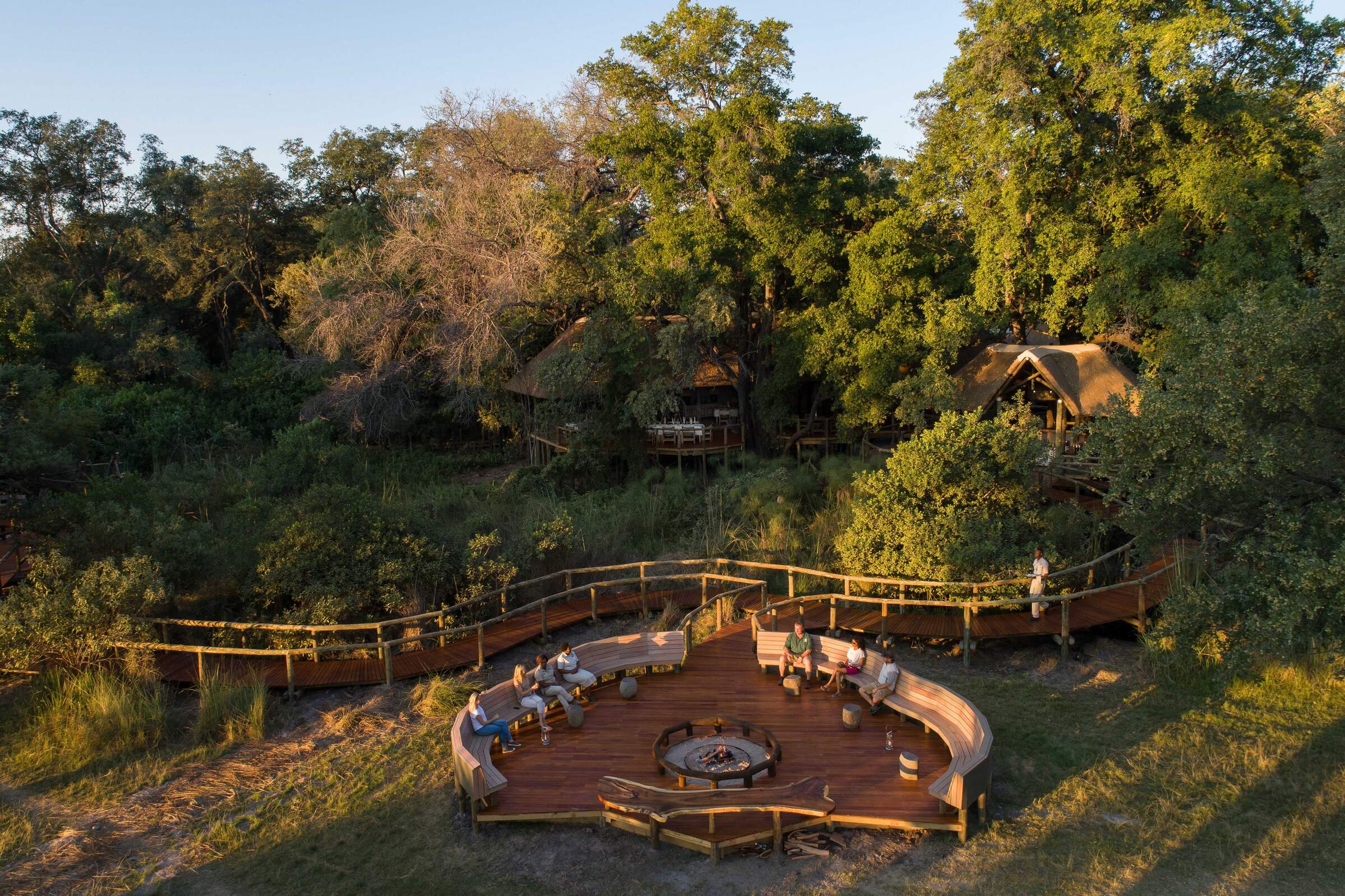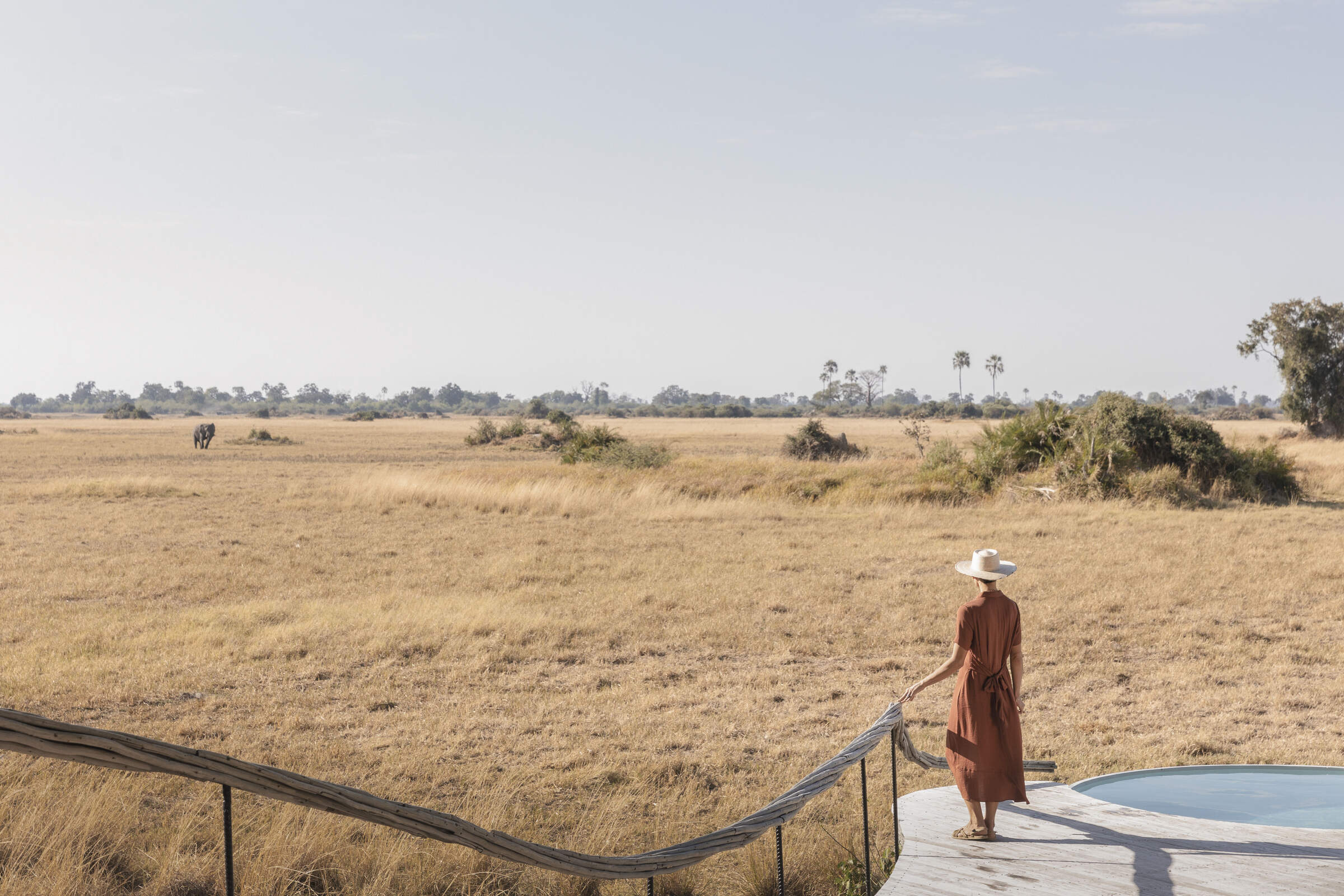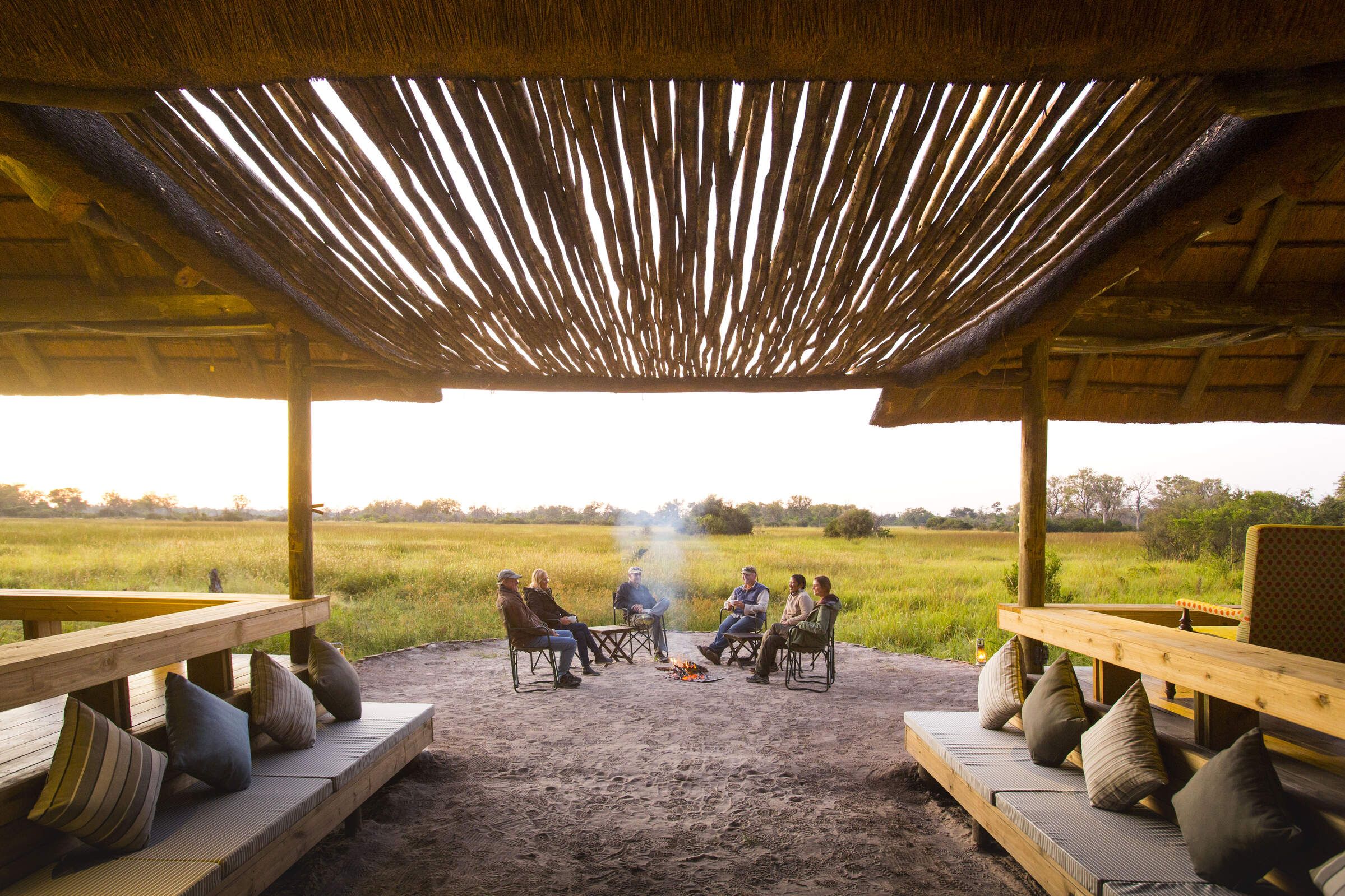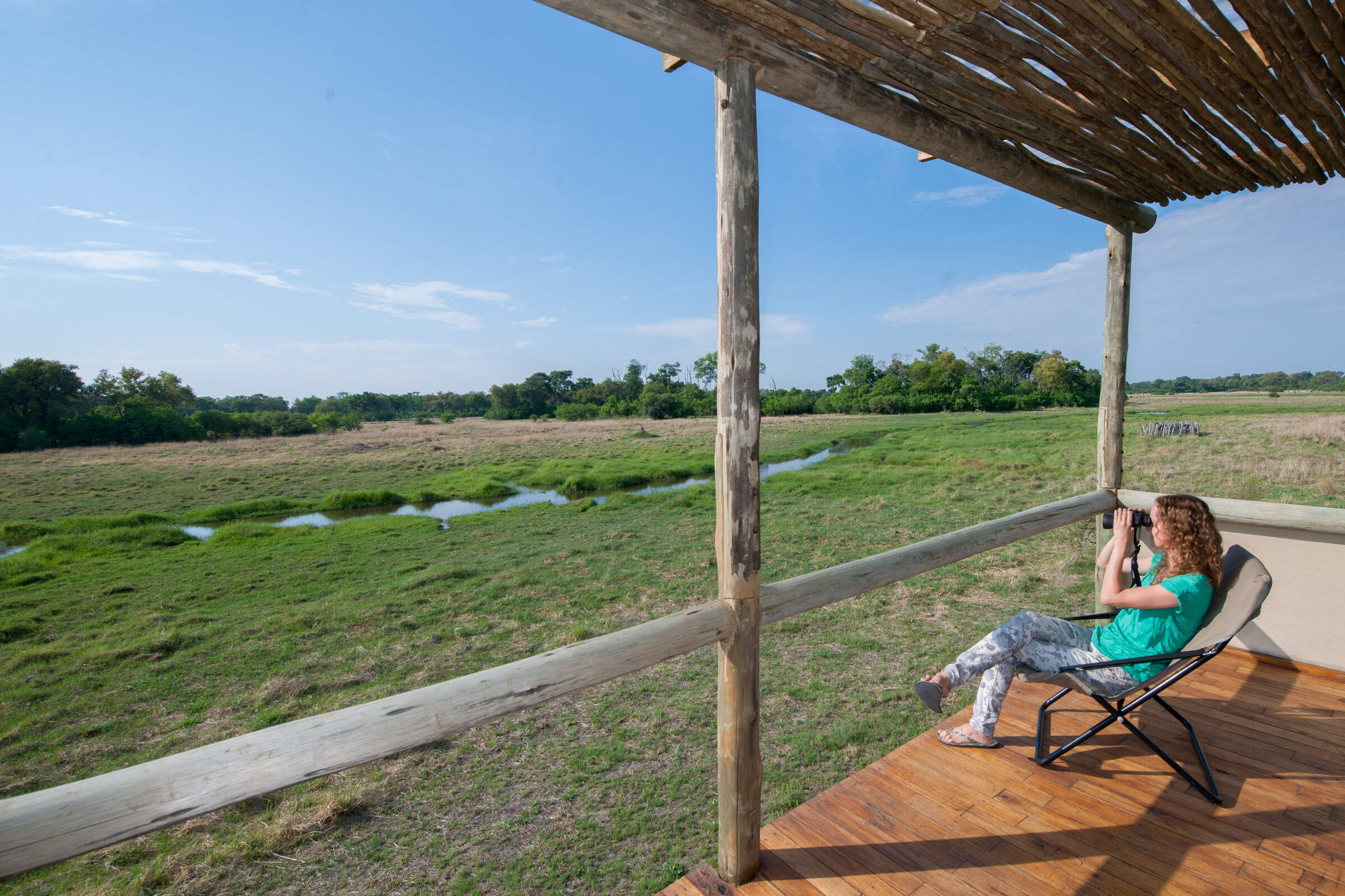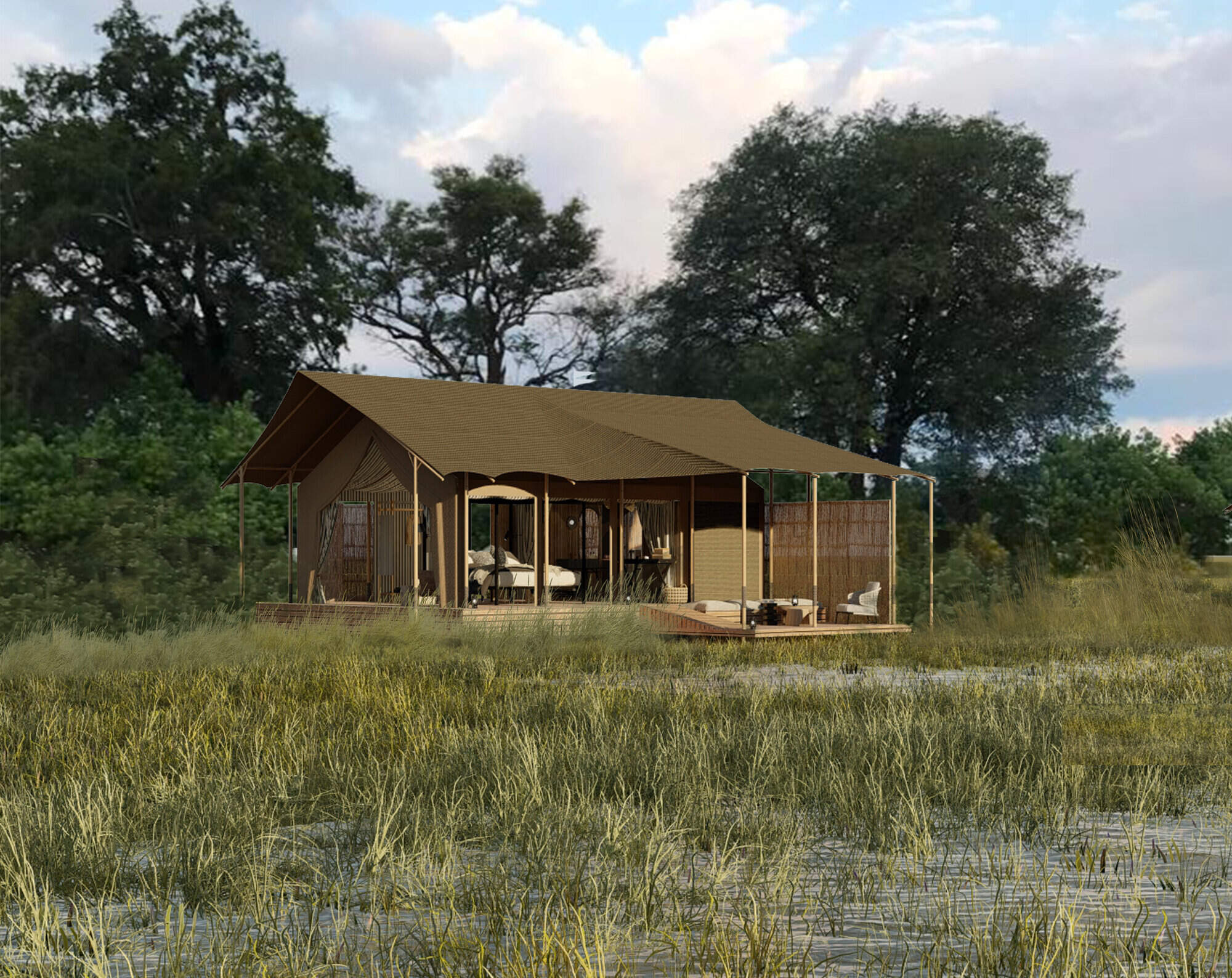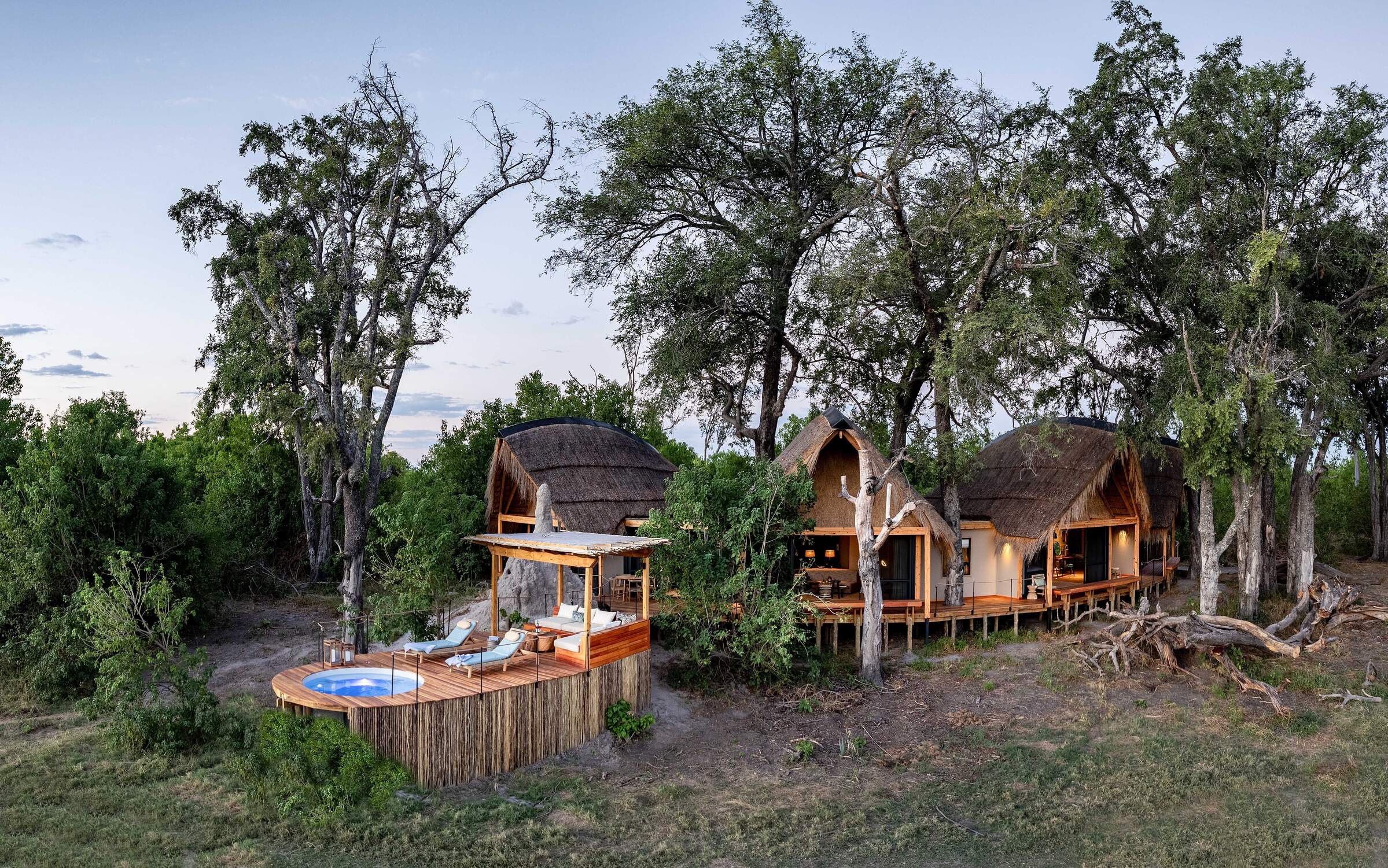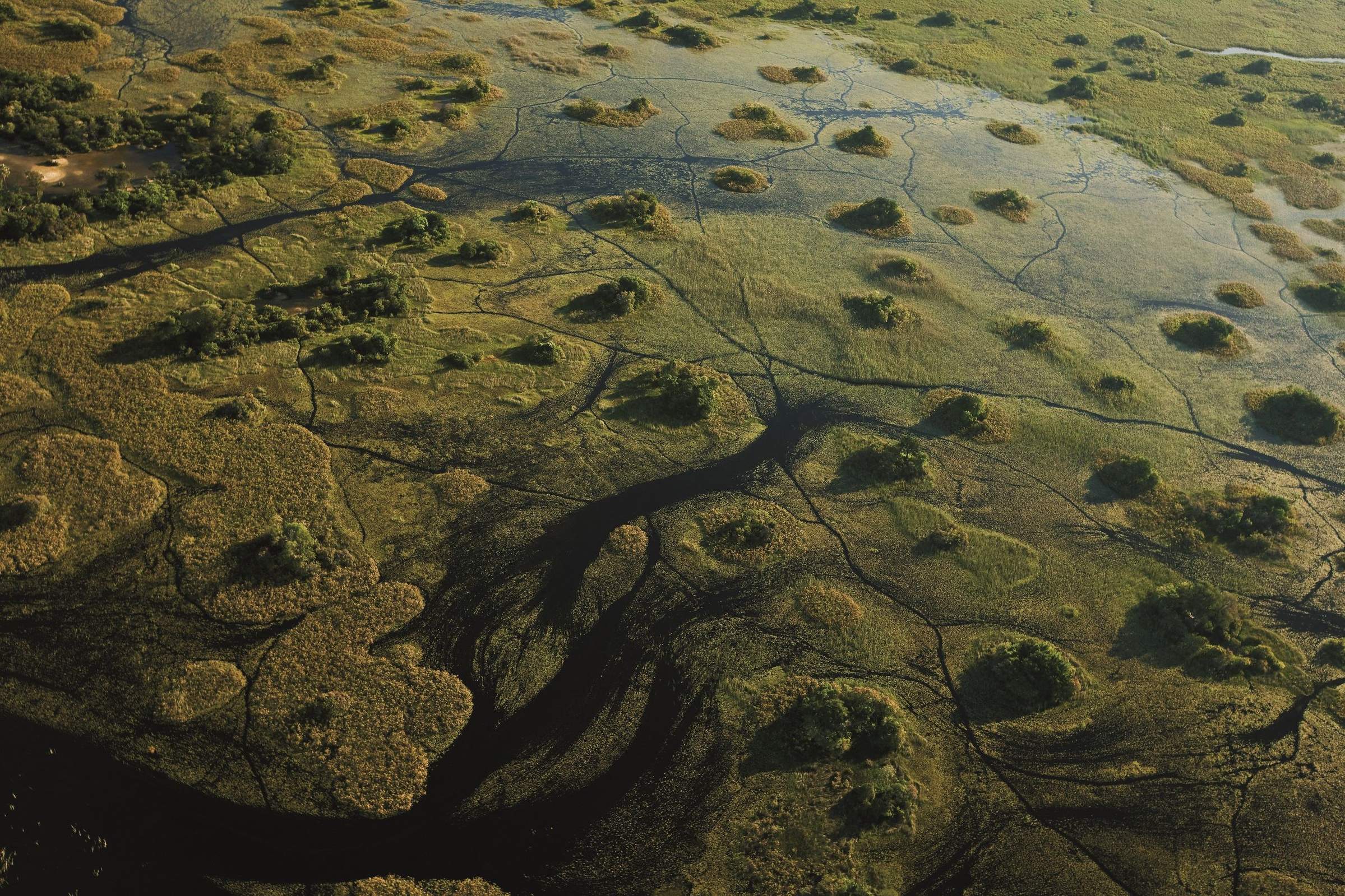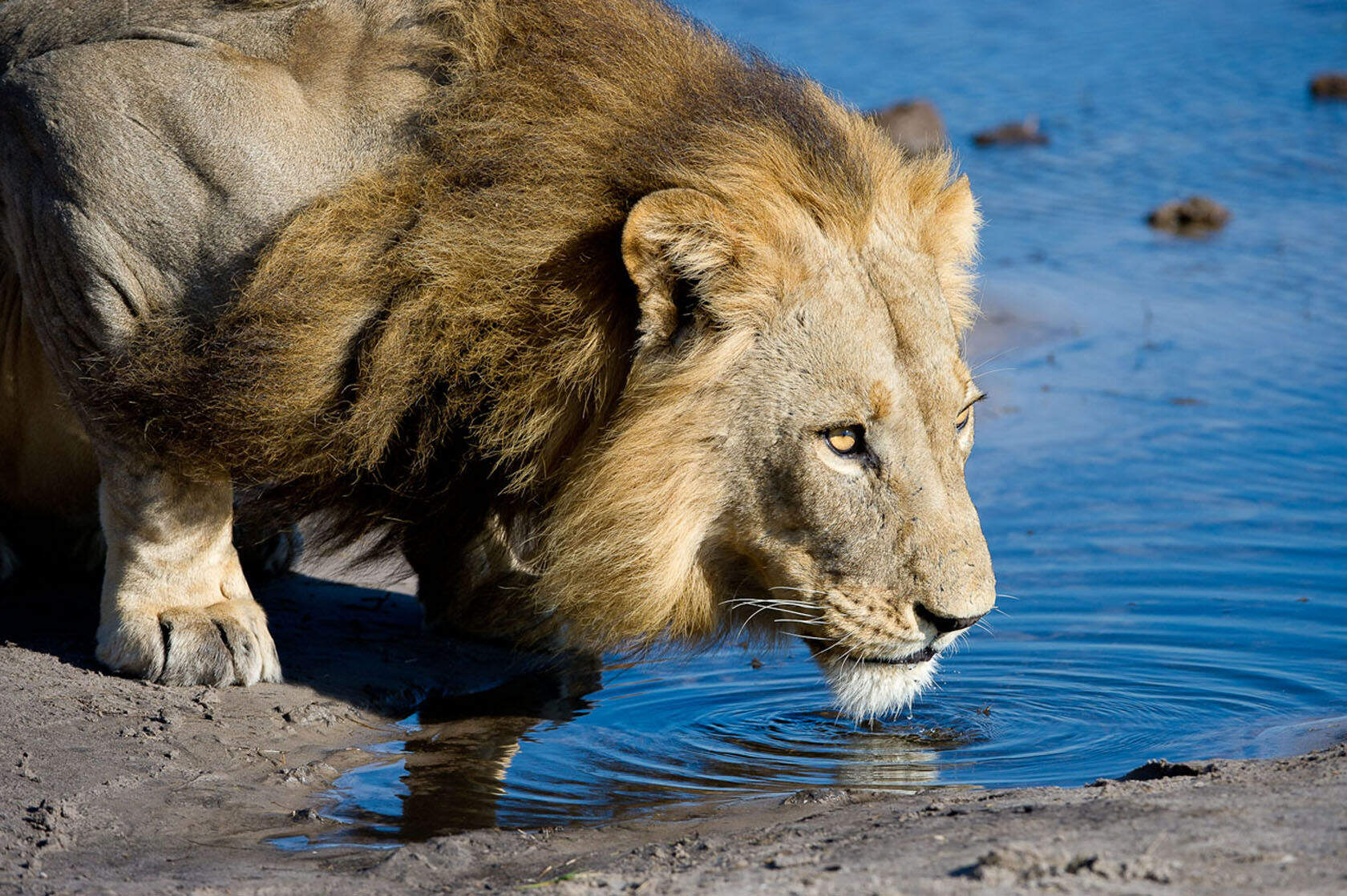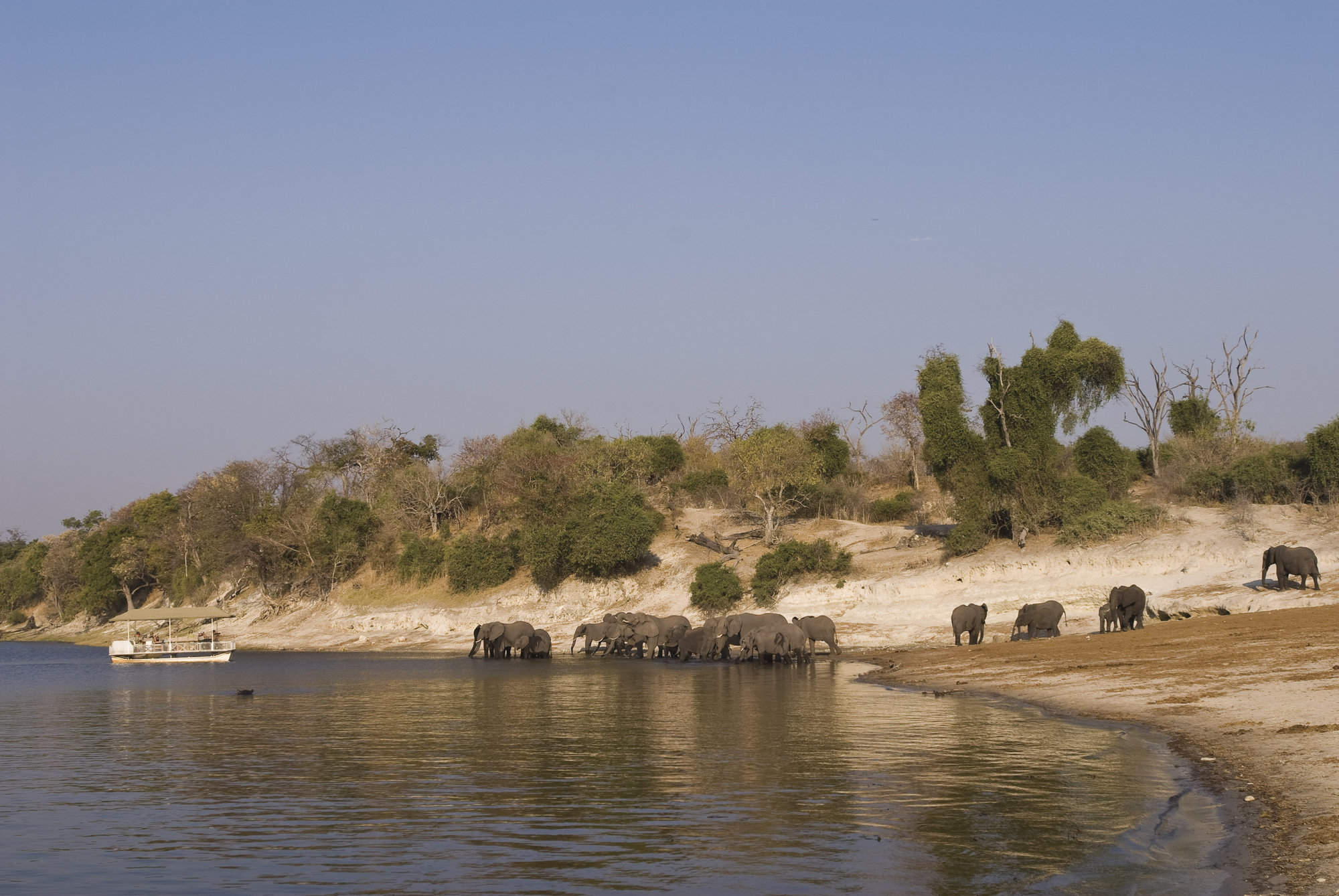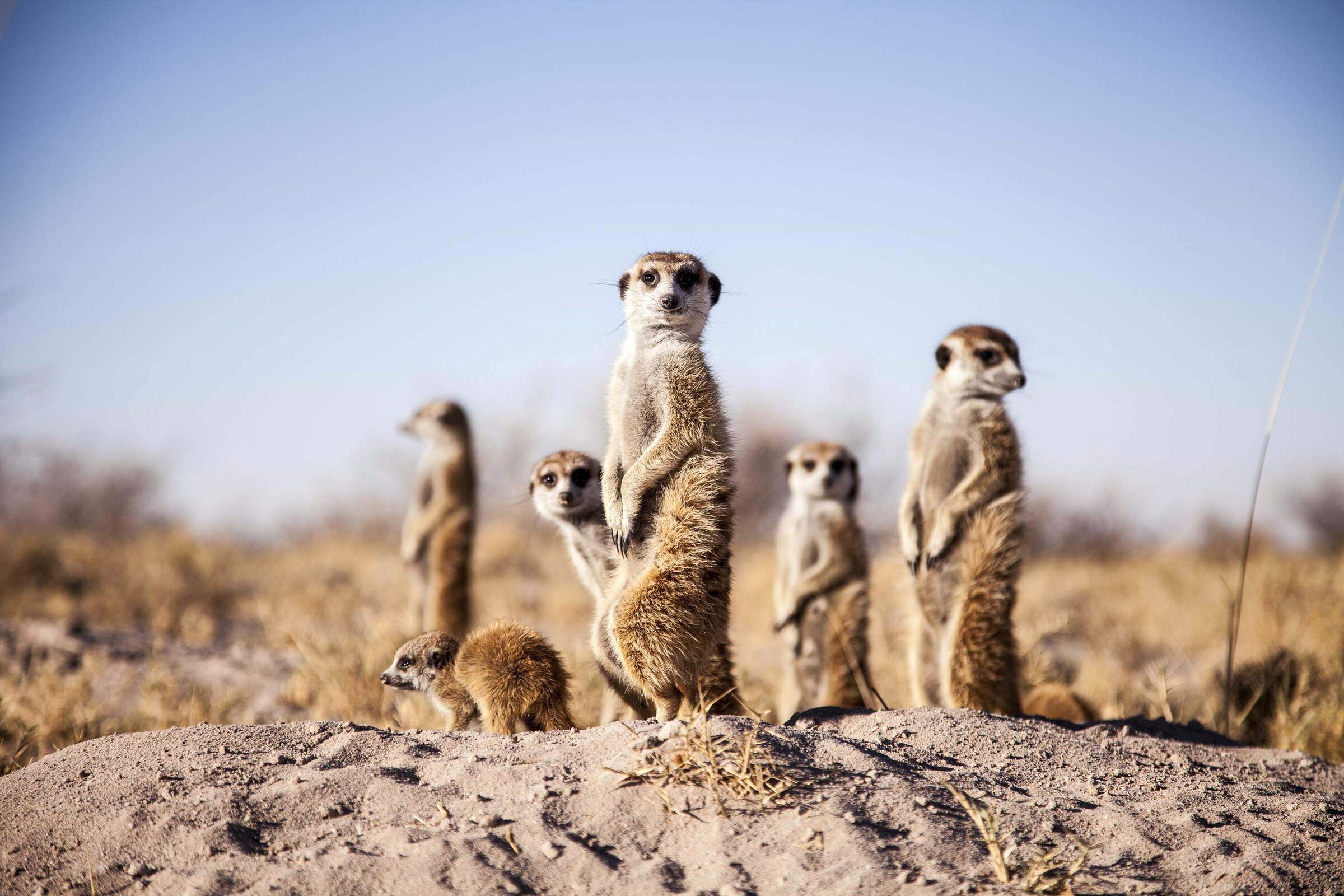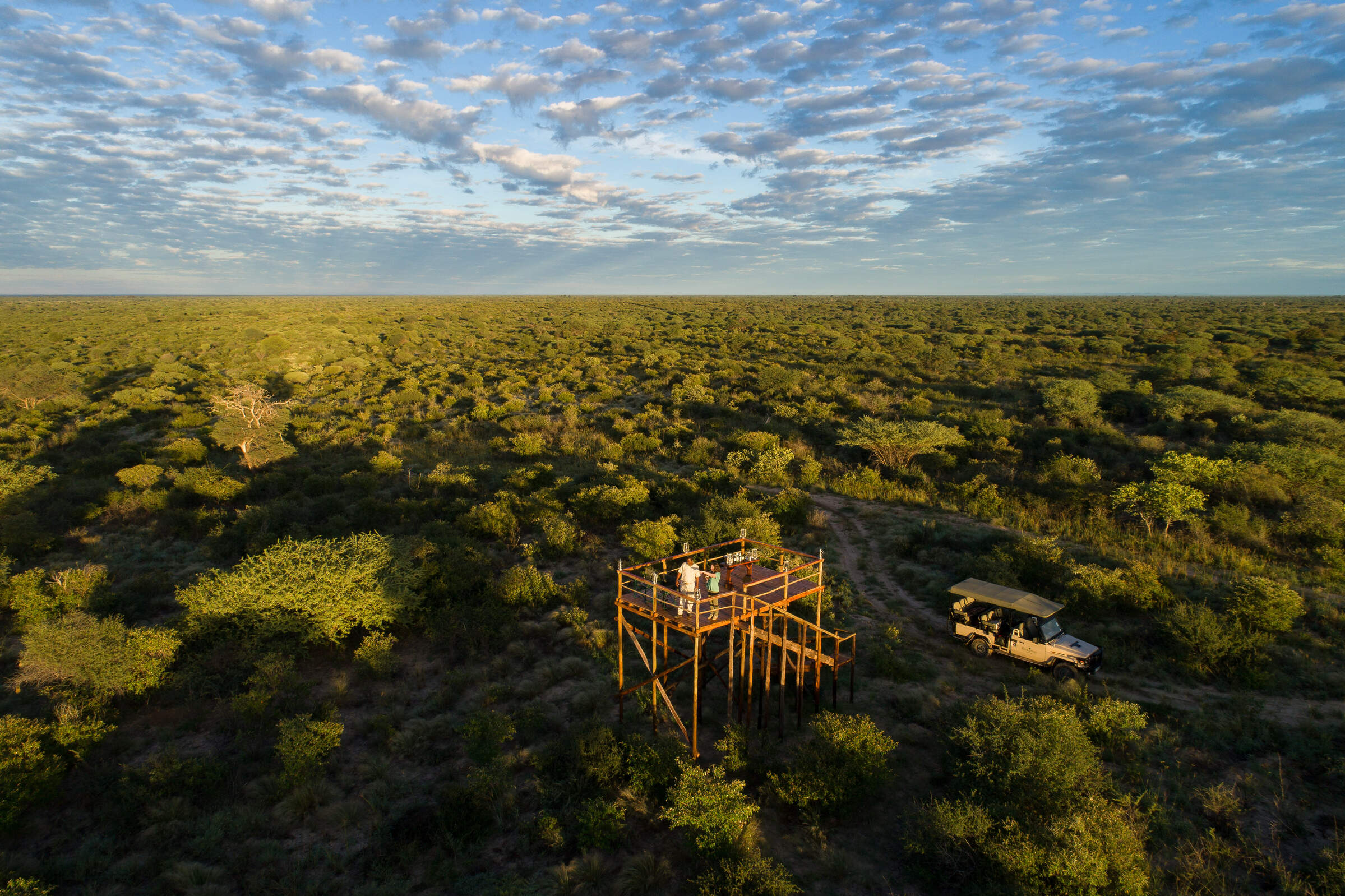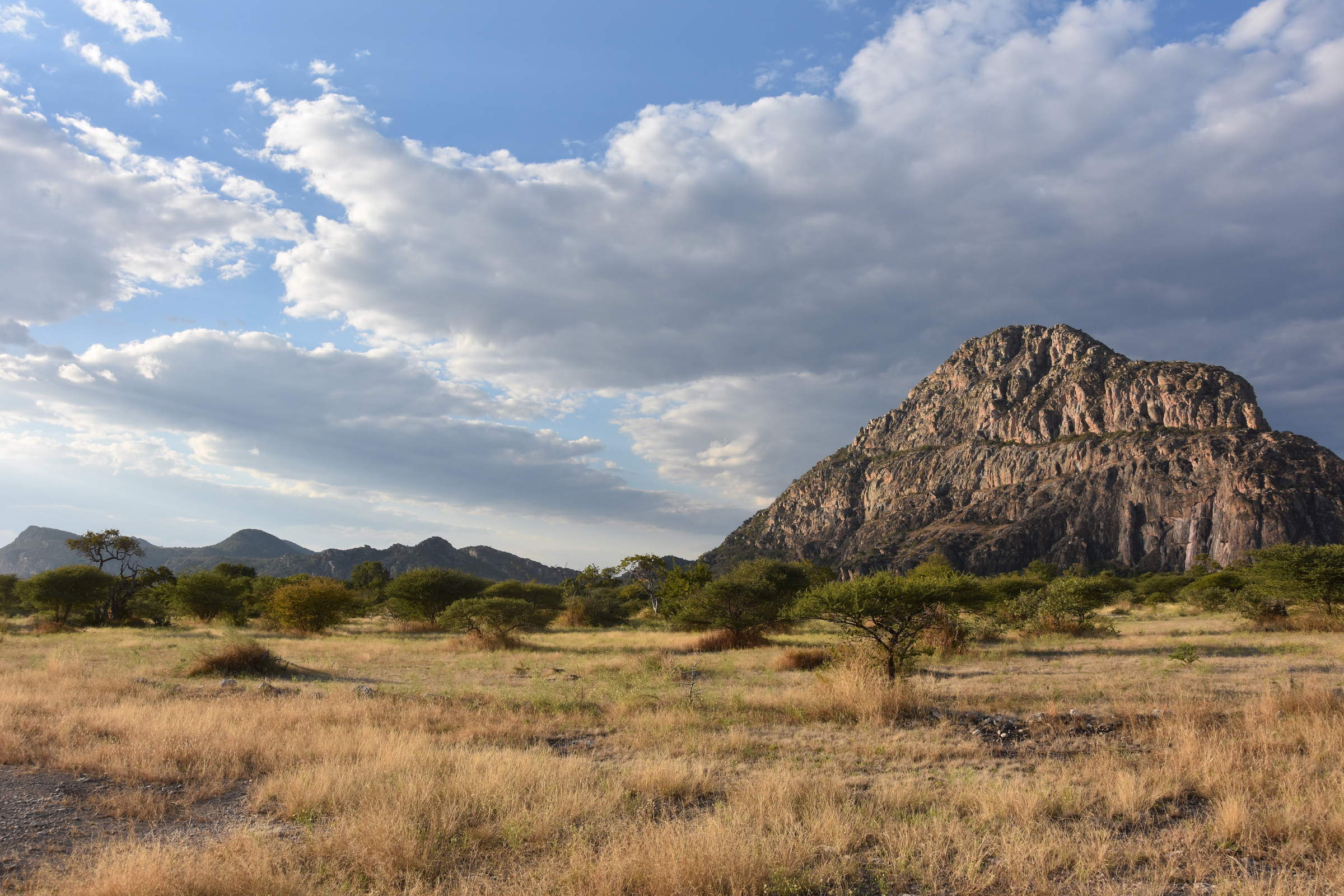Mokete: Our full report
Opened in April 2024, in an area criss-crossed by animal trails, Mokete Camp is new.
It stands in quite an innovative location in the Mababe Depression, just beyond the eastern edge of the Okavango Delta.There are wetlands in season here, when the floods from the Delta extend this far, but in most respects it is more of a “Kalahari” wilderness destination, with areas of vast open grasslands, marshes, mopane forests and a few honey-pot waterholes, which form the centres of endless game trails.
Mokete (which means “celebration” in the Setswana language) is a celebration of the bounty of life amidst the immense flat grasslands of the Mababe Depression since 2013. It was then, when the tectonic plates deep under the Okavango faultlines shifted, that the Khwai River started flowing into the area, creating a haven for wildlife; how long it will last will depend on the movement of those faultlines.
The camp stands in a private concession to the east of Moremi Game Reserve's Khwai River area. We first visited in October 2024, and were really impressed.
The nine wood-and-canvas chalets at Mokete are of a good size, built on raised decks above the surrounding bush. All are open on several sides to allow the air to flow freely.
Innovative insulated canvas walls and roofs, together with an Evening Breeze cooling system, a ceiling fan and a standing fan, combine with large mesh windows to help keep the interior relatively cool, while roll-down canvas and clear plastic blinds come into their own in case of inclement weather. We liked the idea that the roof above the bed the tent could be opened to allow you to sleep under the stars, although a larger view would have been good.
The chalets are decorated in neutral tones and simply, but comfortably, furnished, with lots of wood, soft suede and leather. The beds, which can be made up as twins or a double, face out towards the fantastic views of the trails and plains beyond. You'll also find a writing desk with a lamp, universal plug points for charging camera batteries, and a tasteful wooden tray featuring tea and coffee, a flask of hot water (which is topped up with boiling water every morning and evening), mugs, glasses and a jug of iced water. A comfortable armchair and sofa in the lounge area at the front of the tent look through the enormous mesh window.
A door to one side of each chalet leads to the en-suite bathroom, complete with a flushing toilet, twin handbasins and mirrors, and a walk-in shower. You'll also find plenty of wooden shelves and hanging space for clothes, extra blankets for chilly winter nights, a digital safe, insect repellent and environment-friendly shower gel, shampoo and conditioner.
Outside on the same platform as the tent is a small plunge pool with two chairs and another table under a shaded porch. We had an exciting moment during the night when we woke to the sound of an elephant drinking from our pool!
Mokete has no dedicated family rooms, but in each chalet an extra bed can be added to the lounge area,
Linking the chalets to the main area are raised boardwalks, without handrails, that unfortunately are poorly lit at night.
This main area is central to the camp, with views out to the plains beyond. Much of it is taken up by an inviting lounge area, an eclectic gathering of comfortable chairs, tea- and coffee-making facilities with freshly baked biscuits in a jar, and a small reference library. At the heart of the building, the open plan bar is the venue for pre-dinner drinks, while opposite is the indoor dining area, although tables are often set up on the veranda area. A small curio shop sells a selection of locally made items.
Welcome relief from the Kalahari heat comes from a small saltwater pool set into a shaded deck with comfortable sunloungers. Behind this is a small waterhole, where the intention is to create a hide from the existing shelter.
Mokete is proudly run off a state-of-the-art solar system, which runs off 72 solar panels and provides all the electricity and hot water in camp. Water is life in this dry environment, and on a “back-of-house” tour you can learn about the water storage and distribution.
Inevitably, in a new camp with a new team, there were glitches during our stay in October 2024, including stocktaking in the bar, for example, but we hope that these will iron themselves out as the team gels. It was also good to see coarse sand being delivered to try and limit the clouds of dust rising from the main access track.
Out of camp, guided morning and afternoon game drives in open 4WD vehicles are the mainstay of the activities at Mokete, but what you see will depend largely on the season, and the timing of the rains. During the dry season, the underground hide on the edge of the marshlands where the Khwai River empties into this vast landscape, is particularly productive. This underground hide is best visited during the heat of the day, it is best to chat to your guide about a visit.
On the tip of everyone’s tongue before our visit was “lion and buffalo interactions”; we were not disappointed. Large herds of many species included tsessebe in the hundreds, when normally they are seen as small groups of 8–15, and buffalo in the thousands. Among our highlights was watching wild dogs blasting through a herd of buffalo as they hunted impala, and watching a pride of 17 lions eat two buffalo they had killed not an hour earlier. At the same lion sighting, we scanned the horizon with our binoculars and counted 160 elephants feeding at the edge of the marsh!
Despite such incredible wildlife viewing, there is one big downside: the dust. With millions of hooves crushing the fine sediments deposited by the Okavango, dust is part of the experience. While it can lead to truly dramatic photographs, it can also be challenging visually. (We suspect that over time the housekeeping team will struggle to keep ahead of the battle, too.)
During the green season, we expect the game viewing to be more challenging. While this is an excellent time for birding and we have been led to believe that the buffalo herds are resident, much of the marsh may be inaccessible due to the deep clay soils, confining the majority of exploration to the fringes of the marsh and the significant pan systems within the mopane woodlands.
Our view
We loved our time at Mokete Camp. It offers an exceptional wildlife experience during the dry season, showcasing large herds of antelope and in particular buffalo. However, these herds can be just out of photographic reach, making binoculars and patience essential; let the sightings develop and you will be rewarded. This contrasts starkly with the lush, watery landscapes of the Okavango Delta where wildlife is often very close. Note, too, that the dust during the dry season is unavoidable here. We haven't yet explored the area in the green or shoulder seasons, when birding is at its best, but would expect lower numbers of wildlife encounters with game drives restricted to drier land. Either way, a relaxed attitude is recommended while the camp and its staff become more established.
Geographics
- Location
- Moremi Game Reserve, Botswana
- Ideal length of stay
- We'd expect 3–5 nights here to be ideal, depending on the focus of your visit.
- Directions
- Mokete is accessed exclusively by helicopter and is a 45 minute flight from Maun.
- Accessible by
- Fly-and-Transfer
Food & drink
- Usual board basis
- Full Board & Activities
- Food quality
- In October 2024, all the dishes we sampled were delicious. As far as possible, ingredients are locally sourced. With advance notice, the camp can cater for vegetarian and many other dietary requirements.
The day usually starts with a light breakfast of toast, fruit, cold meats and cereal, along with tea and coffee, served prior to your early-morning game activity. A full breakfast of eggs, bacon and sausages is also available.
Brunch is offered after the morning activity. We were served a delicious meal of hake, beetroot salad, artichoke green salad and homemade bread. We were also treated to an incredible private lunch, of beef fillet with avocado salsa and chickpea salad.
Afternoon tea, at around 4.00pm, usually combines a savoury snack, like homemade sausage rolls, with something sweet such as fresh doughnuts and a fruit salad. These are served with fruit juice, hot and iced teas and coffees.
Dinner is usually a plated starter; ours was butternut soup and home-made bread. For the main course, an excellent lamb stew came with mushroom and bulgur wheat, lentil and green-bean salad and a green salad. Dessert was malva pudding. - Dining style
- Mixture of group dining and individual tables
- Dining locations
- Indoor and Outdoor Dining
- Further dining info, including room service
- There is no room service.
- Drinks included
- Bottled water, soft drinks, local beers and spirits and a limited selection of (usually) South African red and white wines are included. Champagne and imported wines and spirits will cost extra and may need to be requested in advance.
Guests are given an aluminum water bottle on arrival which they are encouraged to top up with cold water in the camp's main area during their stay.
Special interests
- Honeymoons
- Mokete, with a private plunge pool in each chalet, and numerous hidden locations for surprise dinners and lunches, makes an incredibly romantic setting as part of a honeymoon in Botswana.
- See ideas for Honeymoons in Botswana
- Photography holidays
- With vast numbers of wildlife in the dry season, Mokete should be high on the list for photography in Botswana. We recommend booking a private vehicle to enable you to set up a specific shot, such as capturing the drama of a herd of buffalo running to water.
- See ideas for Photography holidays in Botswana
- Wildlife safaris
- Mokete offers some of the best wildlife safaris in Botswana during the dry season, with a huge focus on herds of buffalo that regularly exceed a thousand individuals, and the lion encounters that ensue. In the shoulder and green season, wildlife will be a little tricker to spot.
- See ideas for Wildlife safaris in Botswana
Children
- Attitude towards children
- Children over 12 are welcome at Mokete. The camp may accept children aged 6–12, but private activities must be booked, and these will be at an extra cost.
- Property’s age restrictions
- Minimum age 6 years
- Special activities & services
- With no family room, this camp is not focusing on family travel.
- Equipment
- An extra bed can be set up in the lounge area of each chalet for a child.
- Generally recommended for children
- We would recommend Mokete for more mature children aged 13 years or older. This is in part because big-game interactions can make game drives longer than at other camps as you wait for a sighting to develop.
- Notes
- Mokete is unfenced, and wildlife is known to wander through the camp on a regular basis. Each chalet has a plunge pool, and neither this nor the main pool are fenced. Children must be under the constant supervision of their parents or guardians
Our travellers’ wildlife sightings from Mokete Camp
Since mid-2018, many of our travellers who stayed at Mokete have kindly recorded their wildlife sightings and shared them with us. The results are below. Click an animal to see more, and here to see more on our methodology.

100% success

100% success

100% success

100% success

100% success

100% success

50% success

50% success

50% success

50% success

50% success

0% success

0% success

0% success
Communications
- Power supply notes
- The camp has a state-of-the-art eco-system for power and water, especially important as it's in a relatively remote area of the Kalahari with no permanent, natural standing water. There is a back-up generator
- Communications
- WiFi is provided in the chalets only, but there is no cellphone reception, no direct phone and no email. Communication is maintained with the head office in Maun via radio.
- TV & radio
- There is no TV or radio.
- Water supply
- Borehole
- Water supply notes
- All toilets, basins and showers are plumbed in. The water from the borehole is saltier than seawater, so is used for such things as showers and the pool.
Health & safety
- Malarial protection recommended
- Yes
- Medical care
- The nearest doctor is in Maun. All management and guides are first-aid trained and medical evacuation is available in case of emergency. There is a nurse on call (via radio) 24 hours a day. Please note that it is only possible to fly out of camp during daylight hours as the landing pads do not have any lighting at night.
- Dangerous animals
- High Risk
- Security measures
- Guests are escorted to their rooms after dark as the camp is unfenced and dangerous wildlife is known to wander through. A thorough safety briefing is given on arrival. “Fog horns” are provided in the chalets to attract attention in case of emergency.
- Fire safety
- There are fire extinguishers at all the tents and in the main area.
Activities
4WD Safari
Birdwatching
Guided walking safari
Helicopter
Night drive
Private activities
Extras
- Disabled access
- On Request
- Laundry facilities
- A laundry service is included. Laundry is collected in the morning and usually returned the same day, weather permitting. For cultural reasons and because clothes are generally handwashed, the staff do not wash underwear. Detergent is provided in each chalet for guests who wish to do handwashing.
- Money
- No exchange facilities are offered. There is a small safe in each chalet, and a larger one in the office.
- Accepted payment on location
- Mastercard and Visa credit cards are accepted; Diners and Amex are not. Cash in the form of South African rand, GB sterling, US dollars, euros and Botswana pula is accepted.
Other lodges in Moremi Game Reserve
Alternative places to stay in this same area.
